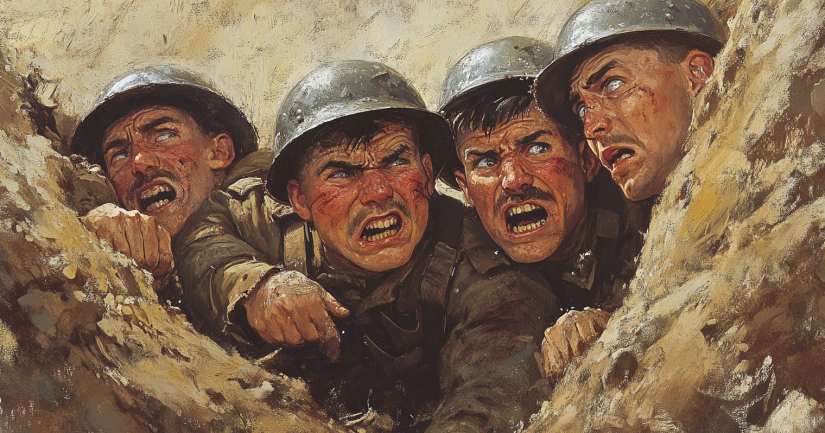
Ready to face the intensity of war? Explore the depths of All Quiet On The Western Front Chapter 3 Quiz. This journey immerses you in the life of Paul Bäumer and his comrades during World War I. You will explore themes of camaraderie, survival, and the harsh realities of war. Each question invites you to delve deeper into the text, uncovering the nuances of Erich Maria Remarque’s powerful narrative.
In this chapter, friendships are forged in the trenches. The soldiers share moments of laughter and sorrow, revealing the human side of war. As you answer, consider how these bonds shape their experiences. You’ll also encounter the stark contrast between the soldiers’ lives at the front and their memories of home. Reflect on how these elements influence their outlook and resilience.
The soldiers are adjusting to war, but danger looms ahead. See what happens next in All Quiet On The Western Front Chapter 4 Quiz. If you need to review how their journey has unfolded so far, revisit All Quiet On The Western Front Chapter 2 Quiz. And if you want to challenge yourself with the whole novel, try the All Quiet On The Western Front Full Book Quiz.
Our quiz challenges you to think critically about the characters’ motivations and the novel’s broader themes. By participating, you will gain a richer understanding of the emotional and psychological impact of war. Get ready to test your knowledge and deepen your appreciation for this literary masterpiece. All Quiet on the Western Front Quizzes: Think you know Paul Bäumer’s journey?
What Happened – All Quiet On The Western Front Chapter 3
In Chapter 3 of All Quiet on the Western Front, new recruits arrive at the camp. The experienced soldiers, including Paul and his friends, observe them. They notice how young and inexperienced the new soldiers are. The older soldiers remember when they first arrived at the front.
Katczinsky, one of the experienced soldiers, shows his skills. He finds food and supplies for the group. The soldiers appreciate Kat’s ability to locate scarce resources. The group discusses their lives before the war. They share thoughts on how the war has changed them.
The soldiers talk about Himmelstoss, a strict training officer. They recall how harshly he treated them during training. They plan to get back at Himmelstoss for his cruelty. The group bonds over these shared experiences and plans.
The chapter also highlights the harsh realities of war. The soldiers deal with constant danger and lack of supplies. They rely on each other for support and survival. The experienced soldiers try to teach the new recruits. They want to prepare them for the tough conditions at the front.
The chapter ends with the soldiers continuing their daily routines. They remain focused on getting through each day. The new recruits begin to adjust to life at the front. The experienced soldiers keep looking out for them. The bond among the soldiers grows stronger as they face the challenges of war together.
All Quiet On The Western Front Chapter 3 – Quotes
- “I’m young, I’m twenty years old; yet I know nothing of life but despair, death, fear, and fatuous superficiality cast over an abyss of sorrow.” – Paul Bäumer, ‘He reflects on the devastating impact of war on his generation.’
“We are forlorn like children, and experienced like old men, we are crude and sorrowful and superficial—I believe we are lost.” – Paul Bäumer, ‘Expressing the emotional and existential toll of the war.’
“To me the front is a mysterious whirlpool. Though I am in still water far away from its centre, I feel the whirl of the vortex sucking me slowly, irresistibly, inescapably into itself.” – Paul Bäumer, ‘Describing the inevitable pull and danger of the front lines.’
“We have become wild beasts. We do not fight, we defend ourselves against annihilation.” – Paul Bäumer, ‘Illustrating the instinctive survival mode soldiers adopt in battle.’
“We are no longer untroubled—we are indifferent.” – Paul Bäumer, ‘Commenting on the emotional numbness developed as a coping mechanism.’
“The war has ruined us for everything.” – Paul Bäumer, ‘Acknowledging the irreversible damage the war has done to their potential futures.’
“Our knowledge of life is limited to death.” – Paul Bäumer, ‘Highlighting how their experiences are dominated by mortality.’
“We are comrades, and brothers, not by choice, but by chance.” – Paul Bäumer, ‘Emphasizing the arbitrary yet profound bonds formed in the trenches.’
All Quiet On The Western Front Chapter 3 – FAQ
Chapter 3 explores camaraderie, the harsh reality of war, and the loss of innocence. The soldiers form strong bonds through shared experiences, emphasizing the value of friendship in the trenches. The stark contrast between their youthful innocence and the relentless violence highlights war’s transformative impact.
Chapter 3 portrays a tense and skeptical relationship between soldiers and authority figures. Soldiers often see their superiors as disconnected from frontline realities. This chapter shows how authority can seem distant or antagonistic, breeding mistrust among the ranks.
Corporal Himmelstoss symbolizes the oppressive military hierarchy. In Chapter 3, he reminds soldiers of the arbitrary and often cruel nature of authority. His strict and sometimes petty enforcement of rules highlights the power dynamics at play and the soldiers’ struggle against dehumanizing treatment.
Survival is central in Chapter 3, shown through soldiers’ daily routines and interactions. The chapter explores their instinctive drive to protect themselves and each other. From sharing food to strategizing in battle, survival is depicted as a physical and psychological challenge that unites them.
Humor acts as a coping mechanism for soldiers in Chapter 3, offering brief escapes from war’s grim realities. Through jokes and light-hearted banter, humor helps them endure hardships, maintaining sanity and humanity, and providing a glimpse of normalcy amidst chaos.
